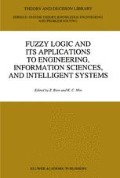Abstract
Fuzzy models are ubiquitous in both theoretical developments and applications of fuzzy set theory. They become particularly crucial when it comes to an extensive and thorough “what-if” type of analysis.
Access this chapter
Tax calculation will be finalised at checkout
Purchases are for personal use only
Preview
Unable to display preview. Download preview PDF.
References
Dubois, D., Prade, H. (1988) Possibility theory - An approach to computerized processing of uncertainty. Plenum Press, New York.
EyckofF, P. (1974) System Identification: Parameter and State Estimation. J. Wiley, London.
Kosko, B. (1992), Neural Netxuorks and Fuzzy Systems. Englewood Cliffs, NJ: Prentice Hall.
Pedrycz, W. (1991) Neurocomputing in relational systems, IEEE Trans, on Pattern Analysis and Machine Intelligence, Vol 13, no. 3, pp. 289–297.
Pedrycz, W. (1993) Fuzzy neural networks and neurocomputations, Fuzzy Sets and Systems, Vol 56, pp. 1–28.
Pedrycz, W, Valente de Oliveira, J. (1993a) An alternative architecture for application driven fuzzy systems, Proc. 5th IFSA World Congress, Seoul, pp. 985–988.
Pedrycz, W., Valente de Oliveira, J. (1993b) Optimization of fuzzy relational models, Proc. 5th IFSA World Congress, Seoul, pp. 1187–1190.
Valente de Oliveira, J. (1993a) On optimal fuzzy systems I/O interfaces, Proc. of the Second IEEE International Conference on Fuzzy Systems, San Francisco, CA, pp. 851–856.
Valente de Oliveira, J. (1993b) Neuron inspired learning rules for fuzzy relational structures, Fuzzy Sets and Systems, Vol. 57 pp. 41–53.
Valente de Oliveira, J. (1993c - accepted for publication) A design methodology for fuzzy system interfaces, IEEE Trans, on Fuzzy Systems.
Zadeh, L.A. (1978) Fuzzy sets as a basis for a theory of possibility, Fuzzy Sets and Systems, Vol. 1, pp. 3–28.
Author information
Authors and Affiliations
Editor information
Editors and Affiliations
Rights and permissions
Copyright information
© 1995 Kluwer Academic Publishers
About this chapter
Cite this chapter
Pedrycz, W., Valente de Oliveira, J. (1995). Semantically Valid Optimization of Fuzzy Models. In: Bien, Z., Min, K.C. (eds) Fuzzy Logic and its Applications to Engineering, Information Sciences, and Intelligent Systems. Theory and Decision Library, vol 16. Springer, Dordrecht. https://doi.org/10.1007/978-94-009-0125-4_19
Download citation
DOI: https://doi.org/10.1007/978-94-009-0125-4_19
Publisher Name: Springer, Dordrecht
Print ISBN: 978-94-010-6543-6
Online ISBN: 978-94-009-0125-4
eBook Packages: Springer Book Archive

